German Colonies In Africa
#Germany #German_East_Africa #Colonies #History #Historical #Britain #World_War_One #German_Colonialism
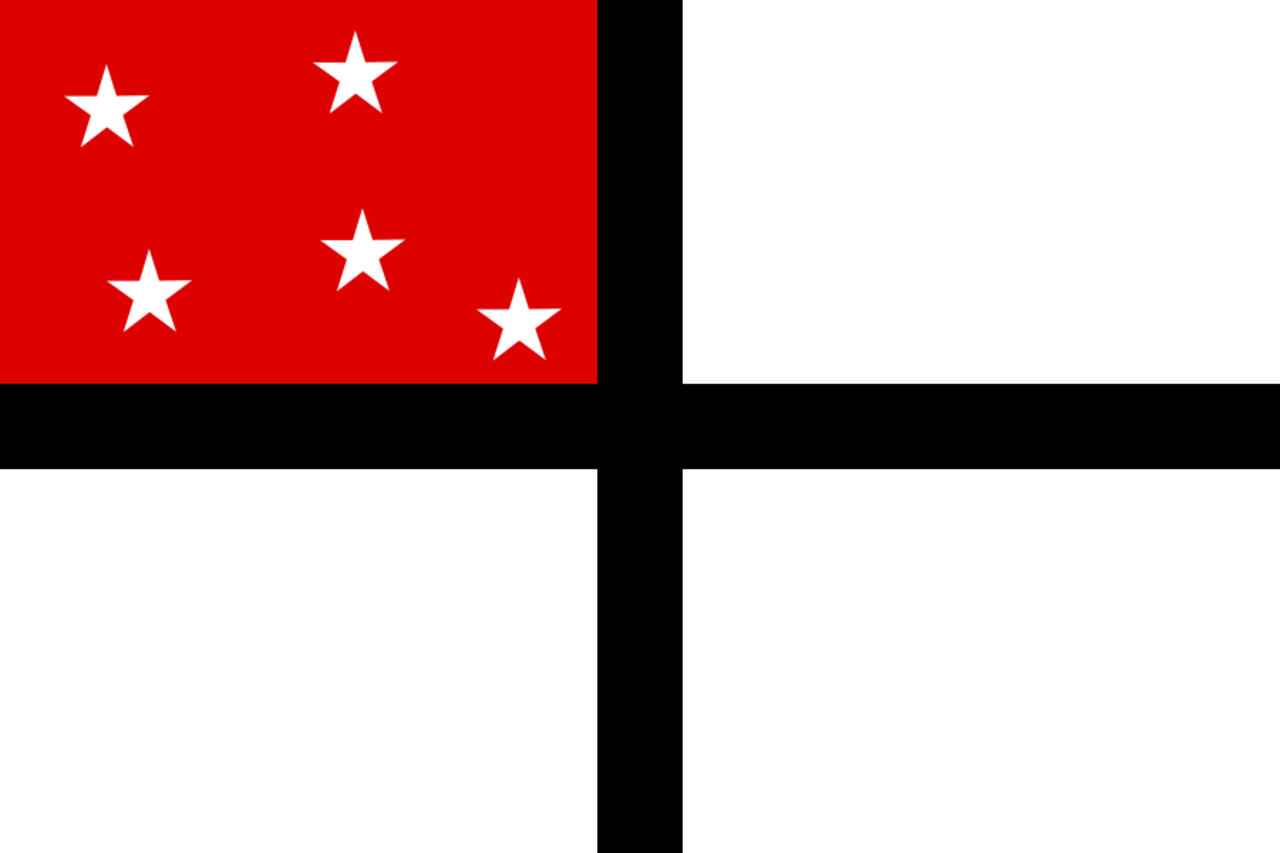
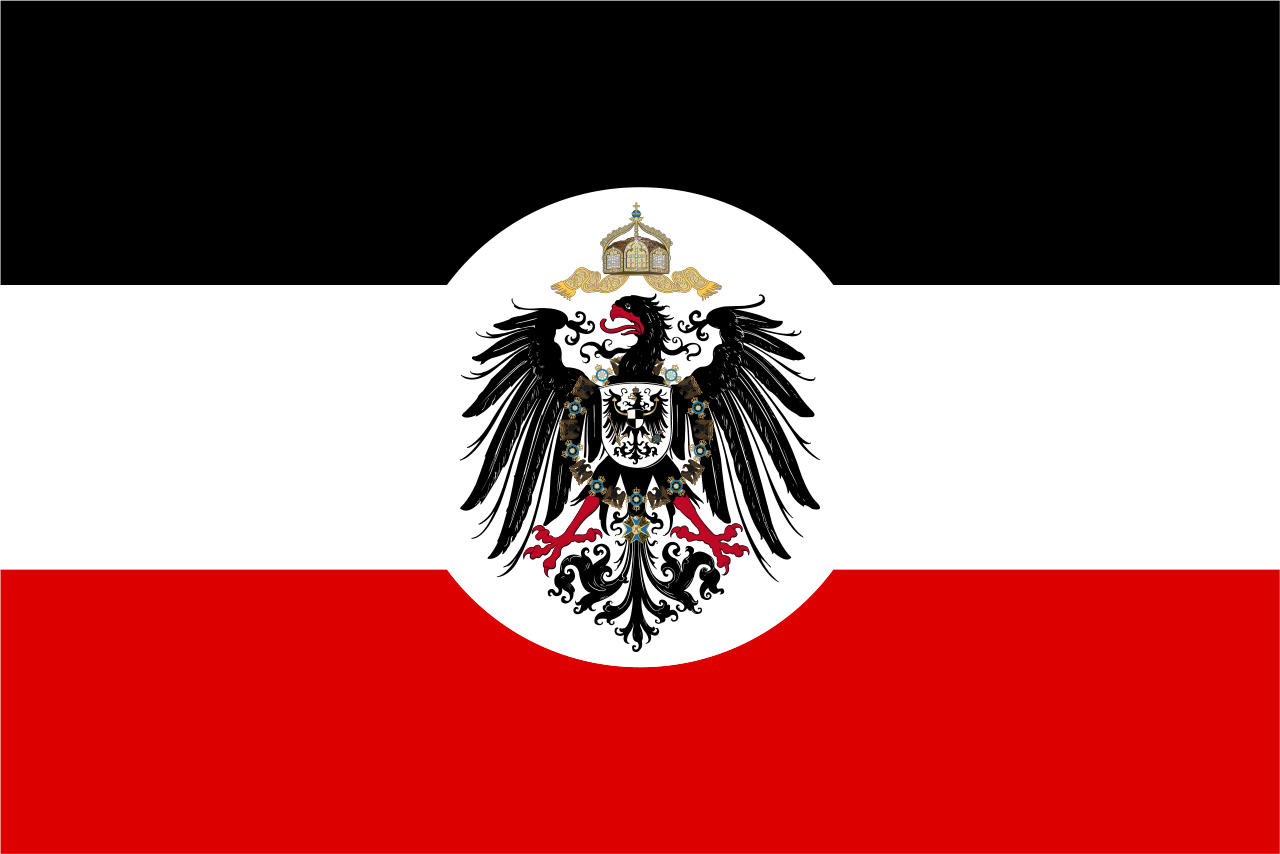
Germany’s relations in Africa started in the period called the period of colonial rivalry over Africa, which resulted in the holding of the grand conference in Berlin to 1884-1885 AD, which Germany called for at that time. Perhaps the note that deserves registration here is that the country calling for this conference (Germany) remained during that The period in Africa does not have a place.
But although the German government did not have until 1884 AD, the year in Berlin, any limited colonies in Africa, the Germans as individuals, Oka explorers, merchants, or as a supervisor had a noticeable activity in Africa before that date. After that, the German government and the German peoplerushed into the colonial trend.
The German missionary missions, in addition to tripsintended for adventure or geographical disclosure and then for the purpose of trade, have been active with West Africa since the seventeenth century. On the continent, some families in Hanover also had a lot of activity in the East African coast. The German surnames, who were known for being outspoken, took on the necessity of finding German colonies to promote their trade in the same way as other European countries.
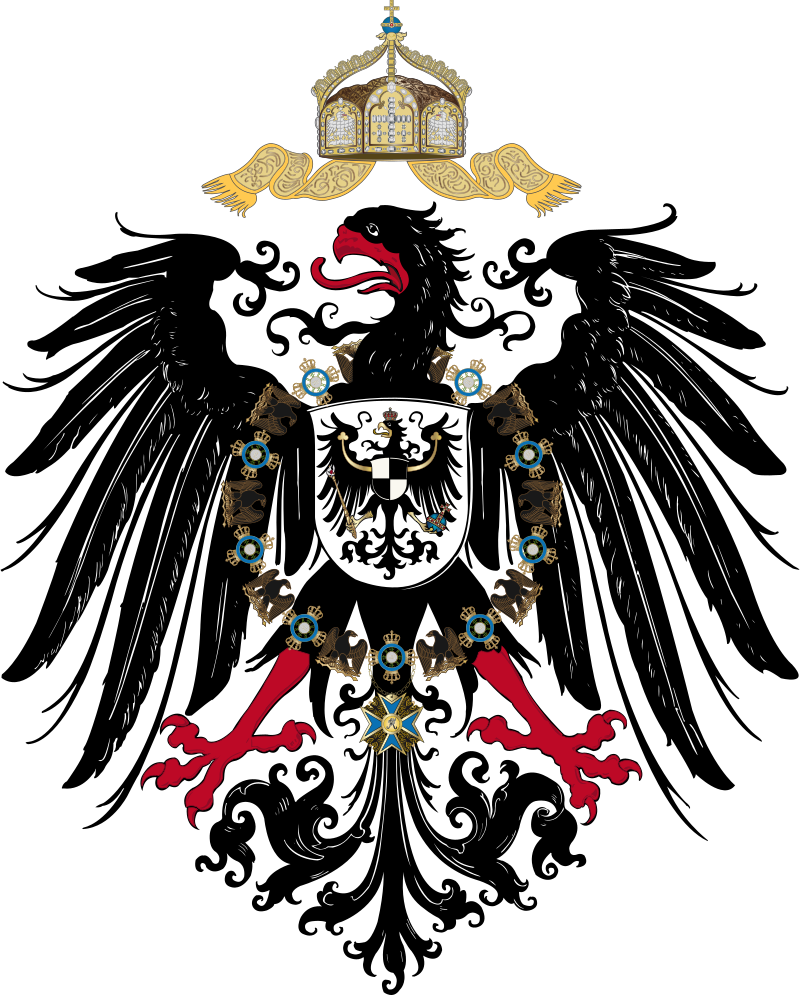
In the year 1878 AD (German Association for African Studies) was established in Berlin and this association had a great scouting activity in the African continent.
And note that the activity of all Germans in this period was based on the shoulders of the great merchants, capitalists, men of Protestant religious missions and the Scouts, and not on the shoulders of the German government, if the German leader Bismarck remained for a long time opposing colonial policy and worked to spare the birth of its problems, but soon changed the situation surprisingly quickly So, the German government shed light on the colonial trend until its security within about one year that the book asked about the reasons that prompted the German government and the German people and the integration into the colonial trend is considered this necessity for several years, and perhaps several factors are what led to Bismarck changing his trade policy Colonization of which:
First: The strength of German public opinion:
Represented in trade, finance, and religious missionaries, these people participated, as we mentioned, in the activity that prevailed at that time. The agreements and treaties that were built on the basis of the colonial states were rights of them, their nationals, and their companies in the African countries.
Evidence for the strength of this factor is that the places in which Germany focused its feet in (Togo, Cameroon, South West Africa, and East Africa) were the same regions in 1884 AD that the strength of their trade and German money men had their relations with them.
For example, the Hamburg trade was broad trade, and the company met even the capitalists in Hamburg to trade with these entities, and the company recommended financial difficulties and the supervisors tried to work for the German government to intervene, and threatened to sell the company in a British institution if the government did not interfere, and the developments of this problem because it led to prevent German aversion to East German Africa (Tanzania).
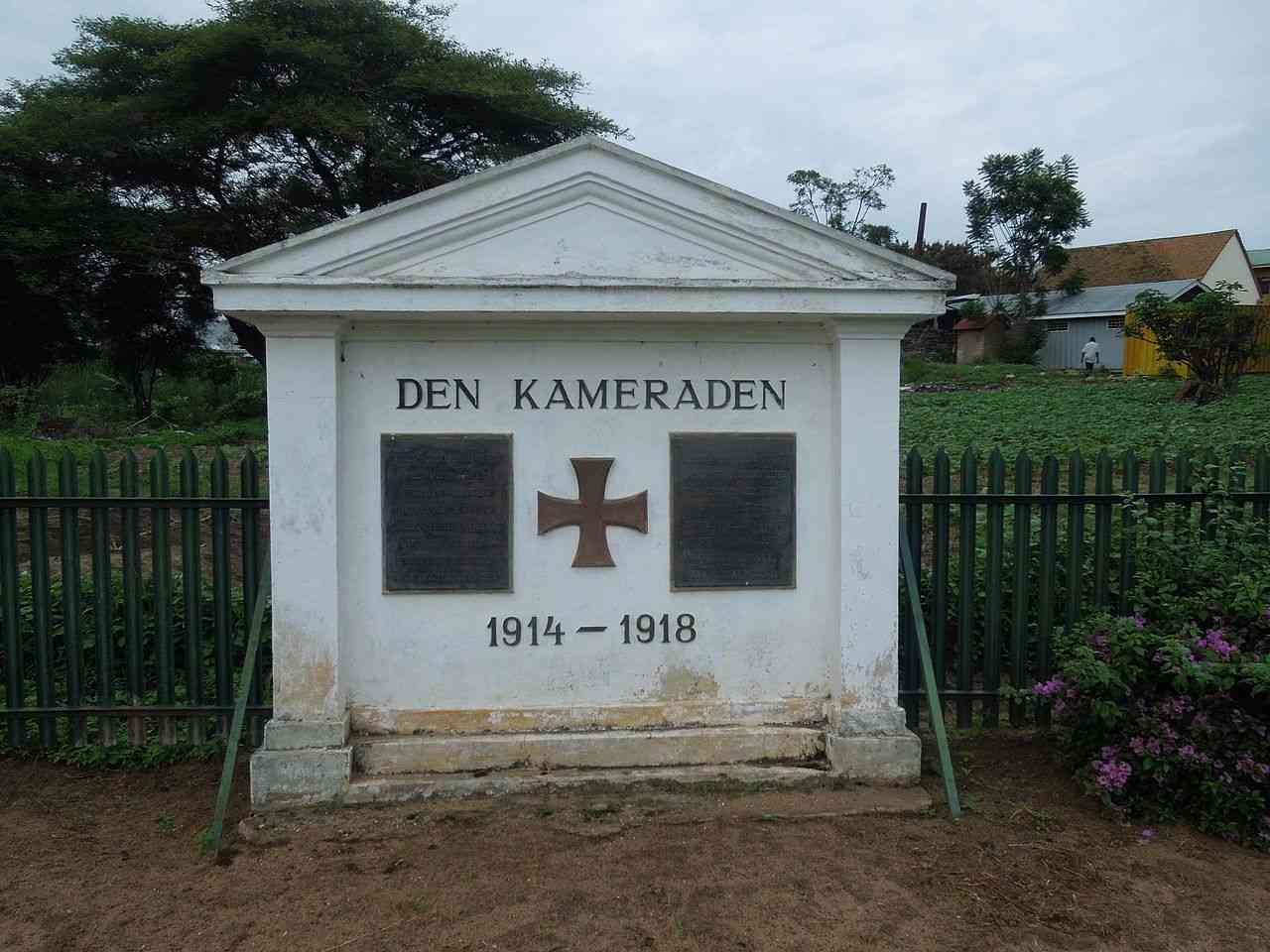
With regard to southwestern Africa, German activity has a large trader also in the dealers of the German port of Parliament, and this man succeeded in establishing a commercial station in southwestern Africa, and faced many difficulties, so he asked the German government to protect his treatment, and in the year 1883 AD he obtained a promise from Bismarck to do so. Regarding the influence of the Germans in Cameroon, the credit also goes to major Hamburg merchants called Wehrmann who was a friend of Bismarck, and he made a memo about the importance of this region and the questioner that he believes it is in the German government’s interest to take into account of Germany’s commercial interests in Cameroon, and it was also he The engine is the activity of the German government in its Togo plan.
Second: The need, such as raw materials and markets, and the solution to unemployment.
The rapid progress in German industry resulted in the accumulation of topics and licenses to own them, but rather led to the disruption of justice and a decrease in the atmosphere, in addition to the desire to obtain the country's products for trade needed for the industry. Hence, thinking has been directed towards the necessity of obtaining colonies to solve the stumbling blocks, lack of wages and raw materials, and finding markets for German manufactures.
Third: The political situation in Germany itself:
The socialist movement had spread in Germany, and a group of grain had been brought up by the Germans in the likes of Karl Marx who adopted these principles and wrote about them, and the German government feared.
The results of the spread of these movements and wanted that Germany trade in the field of colonialism may open the door to workers and solve some economic problems and face the attention of the outside rather than thinking about the internal problems that might lead to a collision between the classes.
Fourth: She was pleased with the German youth, who moved him to immigrate abroad:
Indeed, young people immigrated to the United States, Canada, and Australia, and the number of these immigrants was estimated between 1820 AD - 1870 AD for two million and three quarters of a million. Germany is in the exploitation of these bodies that attract young people to immigrate to, so the solution to this problem was in the face of the German government’s view that there are dependent colonies and the major necessity and encourages German youth to immigrate to them and work with them without complicating his connection and loyalty to his country of origin.
Fifth: The policy of other European countries (Colonialism in Africa)
This colonial policy led to the colonial costs on the continent, and we mention in particular in this field the policy of Leopold II of Belgium in the matter of the Congo.
Sixth: Some writers consider Germany's exit to the field of colonialism as having completed its internal unity.
After the German trade and the internal problems of Germany had to face its outward view, that is to say expansion, Char Luxa has historically proven the theory that unity at home has always been followed by expansion abroad.
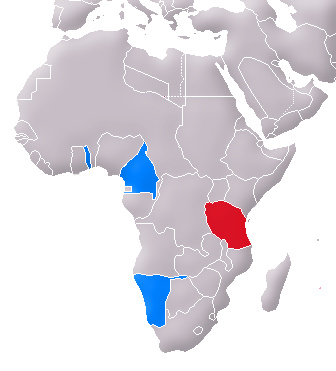
The regions to which Germany's colonial influence extended in Africa:
First: in southwestern ِAfrica:
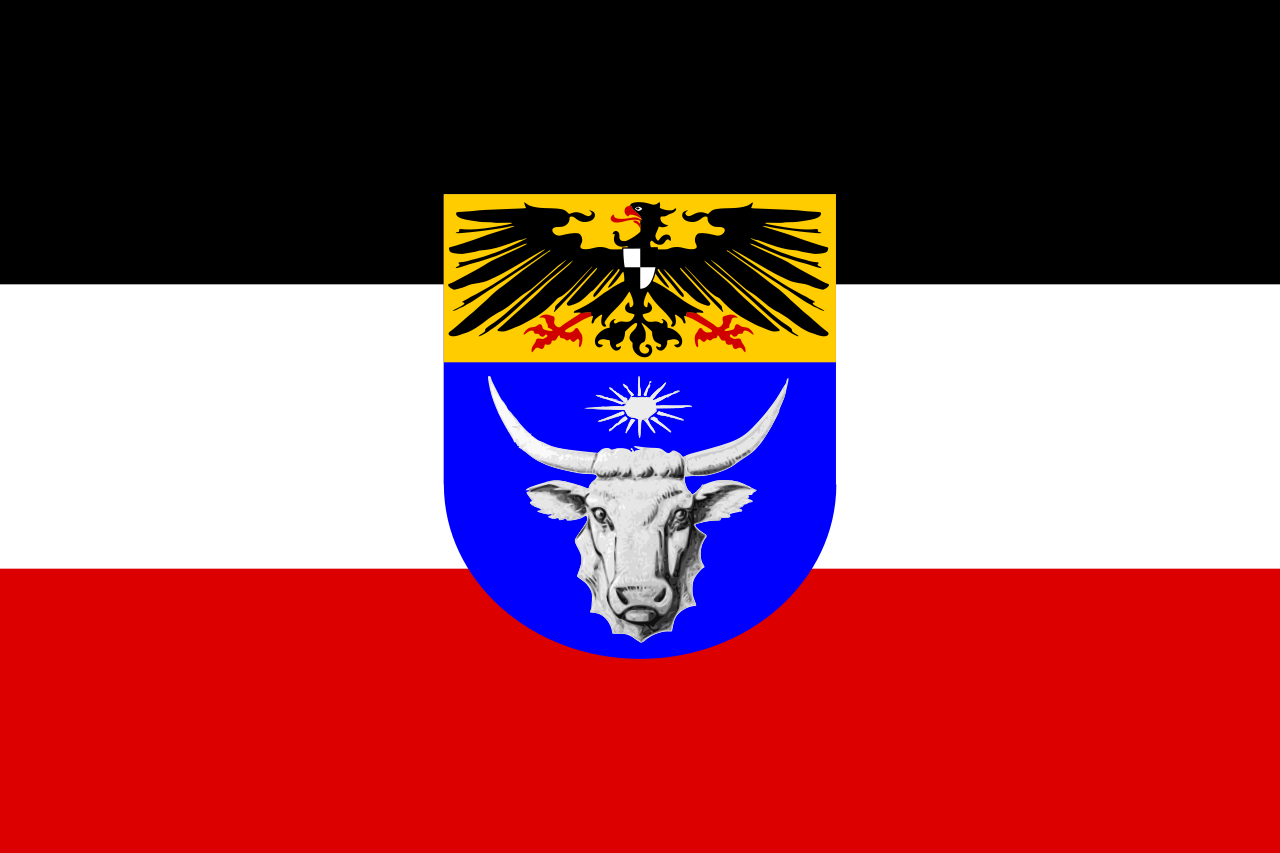
We mentioned that the German missionaries had started their activities in South Africa in the United region north of the Orange River and that since the seventies in the 18th century.
And with the waves of the upbeat prophets, the supplies came from the capitalist merchants, and this trade with their influence begins the industrial revolution in Europe for their economic interests, which they have the protection power that pushed the German government after that to the colonial field in West and Southwest Africa.
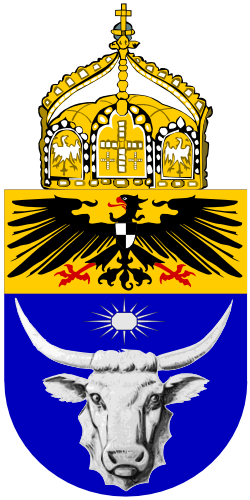
The German missionary and trade was formed in the exposure of its members to the owners without a presence that could provide them with assistance, and when it formed a dress of that, he sent, in agreement with Portugal and England, plans for the borders of the German influenced area in West Africa extending north to the number of Portuguese tours and in the south to the Orange River and bordered to the east by the British.
Second / in Togo and Cameroon:
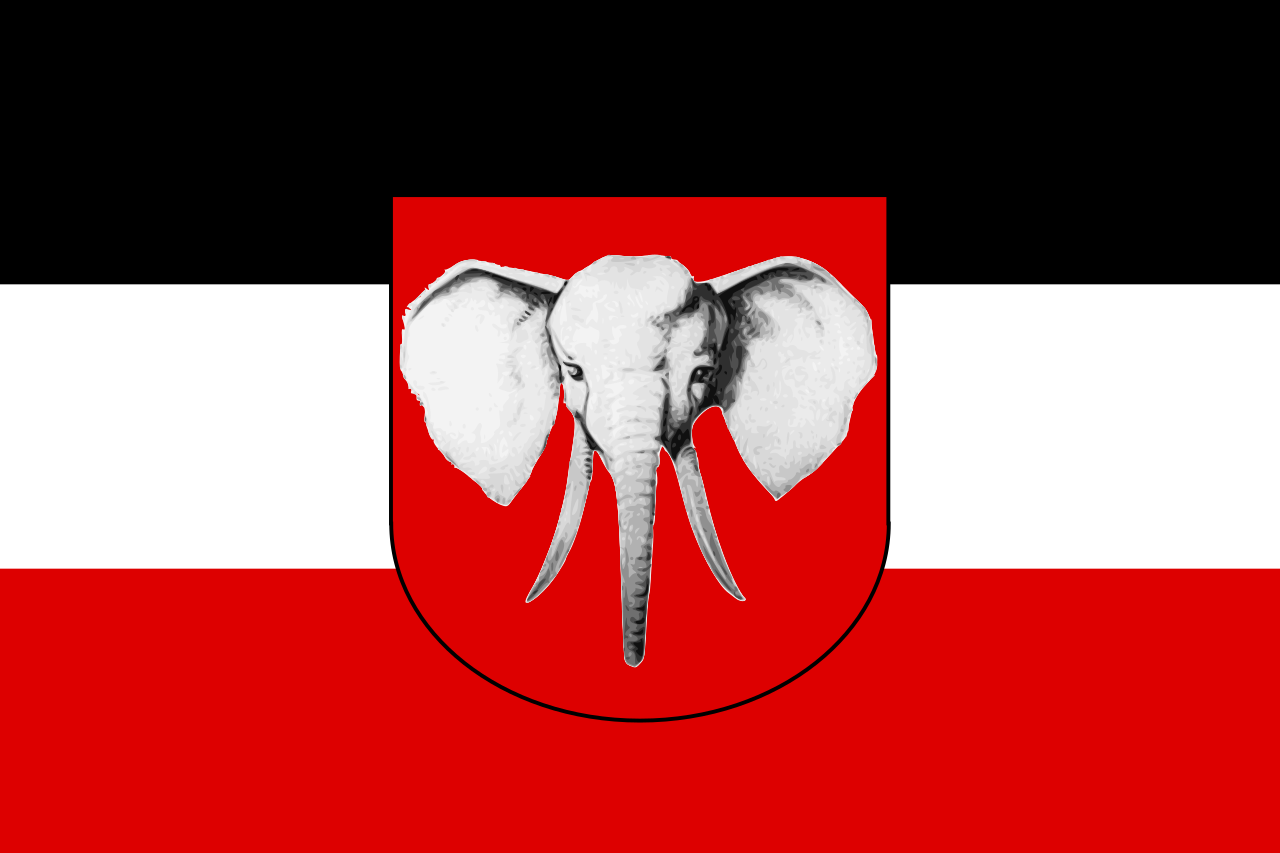
German merchants had a commercial activity with the West African coast and the Ghana coast in particular, and they were constantly pressuring the German government to push them to establish their feet for these entities and to place representatives in them supported by military forces so that traders can guarantee their financial and commercial interests.
There, the German government sent Dr.Gustav Nachtigal
to discuss the possibilities available to these entities for the activity of German capitalist merchants.
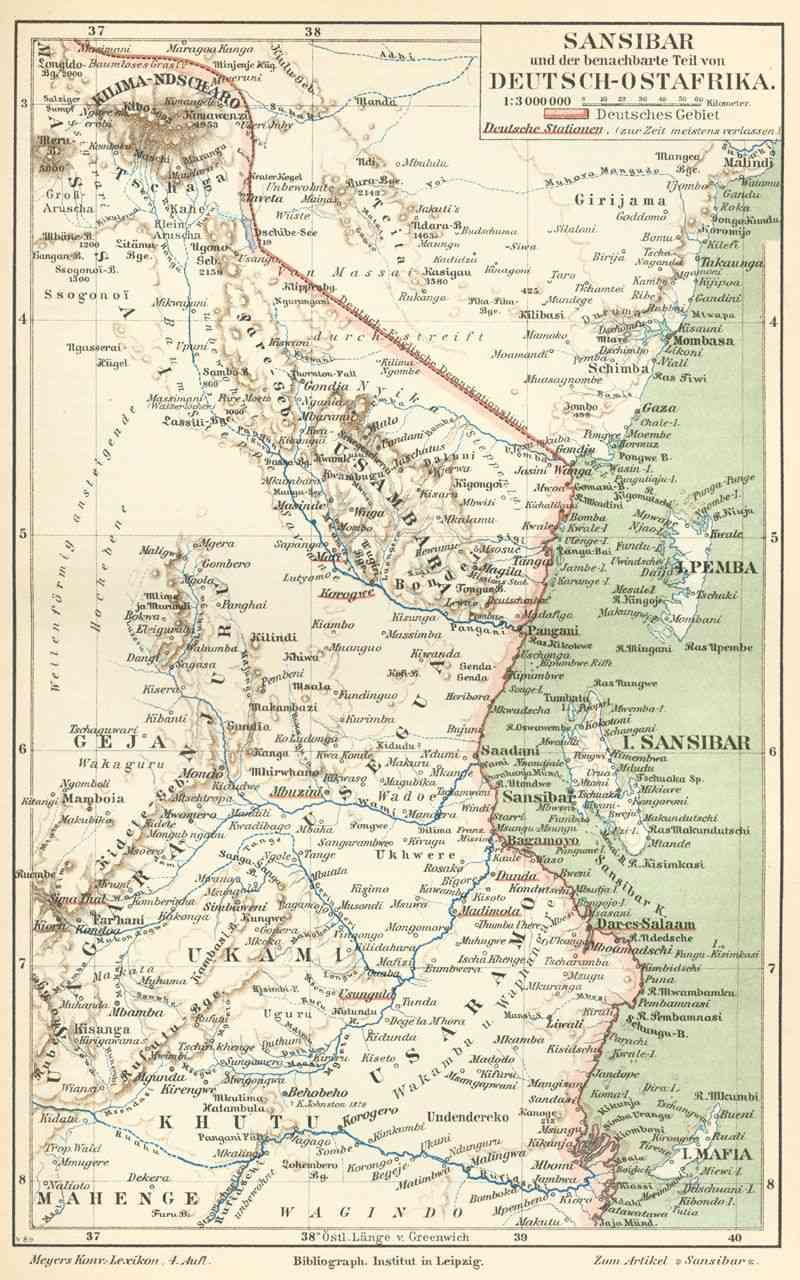
In July 1884, Dr.Gustav Nachtigal arrived in the area to the east of the English colony in the Gold Coast (between Gold Coast and Dahomey), where he was able to conclude agreements with local leaders and announce the establishment of the German Togo Protectorate. After that, Dr.Gustav Nachtigal sailed towards Cameroon, where she was reaping from a period of bargaining with a local leader to sign a document granting the Germans rights in these quarters in exchange for a generous gift promised by German merchants, and Gustav Nachtigal succeeded in his mission and raised the German flag announcing the extension of German influence on these parties.
This work sparked the dispute between Germany and France and remained between the two countries until France continued to extend its influence to Marrakech (Morocco) in North Africa. Germany stood in the face of French ambitions in these areas, but the two countries reached in 1911 AD an agreement that would release France in Marrakesh in In exchange for France to give up its claims to Germany in the Togo regions, the two countries settled their differences at the expense of the African people.
We talked about the commercial and scouting relations that the Germans had made on the East African coast, especially in the Zanzibar region since the mid-18th century CE.
The trade movement in these regions in East Africa was in the hands of Arabs and Indians a long time ago, but the Sultan of Zanzibar opened a town for traders with European commercial companies and encouraged European commercial houses to extend their activities to a country, and European trade with these areas was the key that opened the door to European influence.
On March 3, 1884 AD, Dr. Karl Peters and some German colonialists established an association called (German Society for Colonization), and Peters announced strictly that the purpose of the association is to undertake colonial projects in Africa.
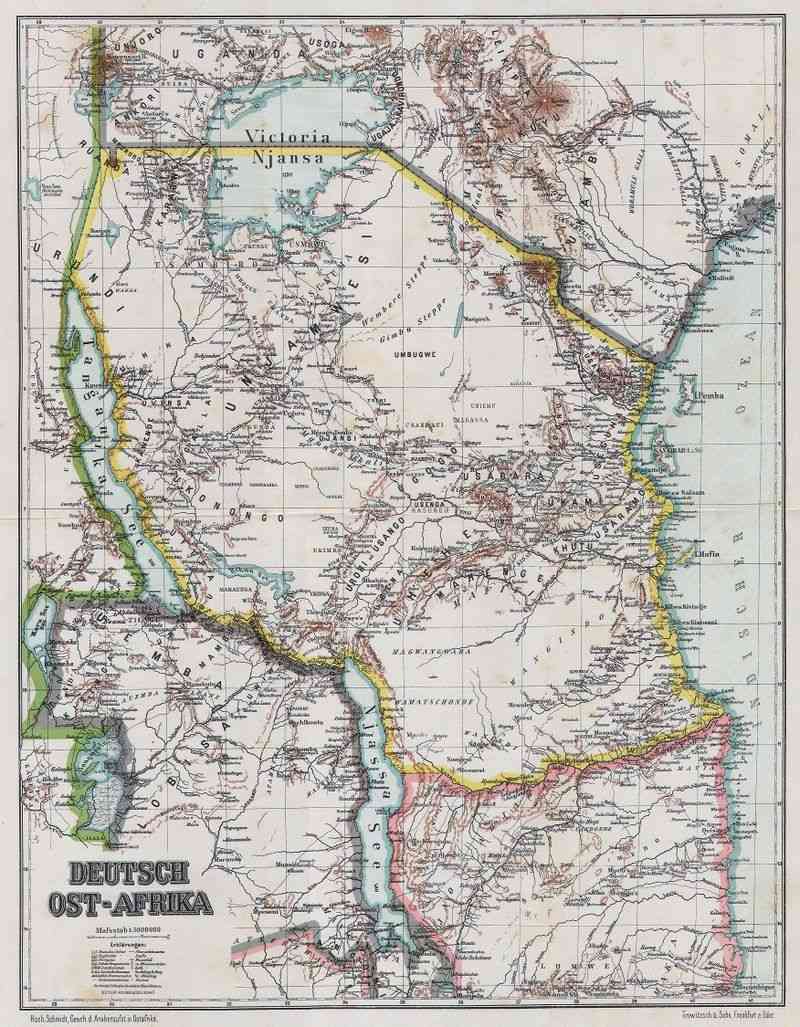
This association lasted for a period of 3 months discussing the selection of the part of Africa in which it can implement its colonial projects, and finally its decision to colonize the part of the eastern coast of the continent behind (Dar Al-Salam) was established, to be implemented by a campaign headed by Dr. Carl Peters and to start its work in October the same year.
The campaign placed before her eyes the possibility of opposing Britain, and therefore took strong precautions in order not to know its true purposes, including that Peters himself was hiding behind different names, and this was served by his proficiency in the English language.
On November 10, 1884 AD, Peters and his companions landed in the East African coast and disappeared at home. After 3 months, the campaign returned, And with it more than ten treaties were concluded with the elders and sultans of some of the provinces neighboring this east coast and under these treaties abdication.
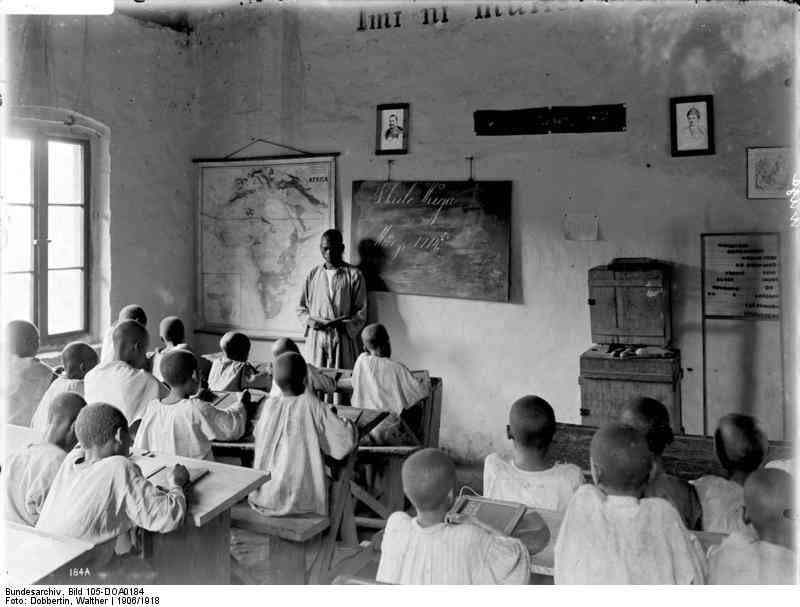
These elders of the German company represented by Peters and his companions on large areas of land up to 60 thousand square miles.
On February 12, 1885 A.D. Peters moved to Berlin and the German government (the German East African Company) was granted a decree to establish it.
On March 3, 1885 AD, the German government chose the signatories of the Berlin Treaty of 1884-1885 CE, while the German government acquired land and sovereignty rights in the continent of Africa, according to the text of Article 34 of the conference’s decisions.
The German notification caused a portion in the London circles and in Zanzibar itself. Sultan Barghash sent the Sultan of Zanzibar in protest to the German Emperor to push part of his lands under German sovereignty. As for the Germans, they knew that the real obstacle to their control over these regions was not in Zanzibar, but in London.
On March 6, 1885AD, the German ambassador to London, Lord Gravel, was informed of the security protection and privileges that the company had obtained and sent Gravel
The British response indicated that the British government did not oppose Germany’s investment to some of these parts that I mentioned, but there is a project that some British financial heads are undertaking to colonize the part between the coast of Mombasa and Lake Victoria, which is the source of the hills and which Britain wants to link to the coast with a new line. This British response was, of course, encouraging for German colonial entrepreneurs.
England and Germany saw to avoid a conflict of their interests in this region in East Africa, Tallinn a committee to determine the grandfathers of Sultan Zanzibar in addition to defining the borders of the English and German spheres of influence, so the French government was invited to participate in the proposed international committee to discuss the issue of the limits of the property of Sultan Zanzibar.
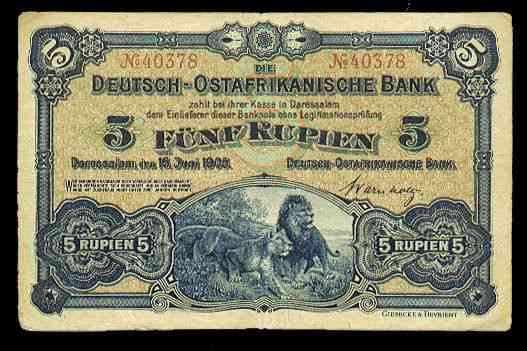
This tripartite commission started its work on December 10, 1885 AD and there was complete agreement between the members of the committee that the Zanzibar and Pemba Islands and the small islands surrounding them and the lands that are no more than 12 miles away are all undoubtedly parts of the property of the Sultan of Zanzibar. The committee visited the African coast and visited the various ports south of Brunei The report, which was clarified by the committee, stated that the Sultanate of Zanzibar found undeniable rights of sovereignty over the islands of Zanzibar and Pemba, and Lamao, as well as on coastal parts extending 10 miles from the coast between Portuguese East Africa in the south and Mogadishu in the north.
and realized the presence of the flags of the Sultan of Zanzibar and its military garrison in these ports, which it is certain that they are subject to it, but the extent of the influence of the authority of Zanzibar and its administration inside was a subject of discussion and disagreement among the members of the committee.
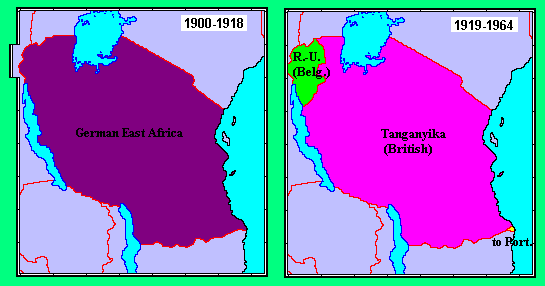
Bismarck was able to resolve this dispute and told the Paris government that Germany is ready to leave freedom of action to France on the Comoros Islands if the two countries reach an agreement on matters disputed. Germany also indicated to England its willingness to work on its own if the two rulings did not reach an agreement, and accordingly both the English and French governments sent their representatives to the committee to reach an agreement with the German delegate until the commission came out with a collective decision.
And it was necessary for that to agree to the two countries to share the interior region located behind the coastline, which the committee recognized as subordinate to the Sultan Zanzibar. On October 29, 1886, the two parties reached an agreement stipulating the following:
1. England and Germany recognize the authority of the Sultan over the islands of Zanzibar, Pampa and Lamua, as well as the coast for a distance of 10 miles inside.
2. The interior lands located behind the coastline are divided into Northern British and Southern German influence areas.
3. England supports Germany in its negotiations with the Sultan to obtain concessions at the Brunei Customs of the German Africa Company.
England informed the agreement to the Sultan on December 3, 1886 AD, in a letter containing advice to accept what the two countries agreed upon, as well as the threat of bad consequences if it opposed, just as Germany sent a German warship in front of Zanzibar.
In the face of these threats, the Sultan agreed to what was imposed on him by the two countries, and he signed the British-German agreement on December 4, 1886 AD. Thus, Germany was able to obtain the southern part of East Africa, and Britain's share was a relatively small area of the East African coast, but it did not include two important ports ( And smiling) This province, which was the share of Britain, has opened the way to
Uganda is located along the northern coast of Lake Victoria and the Upper Nile region.
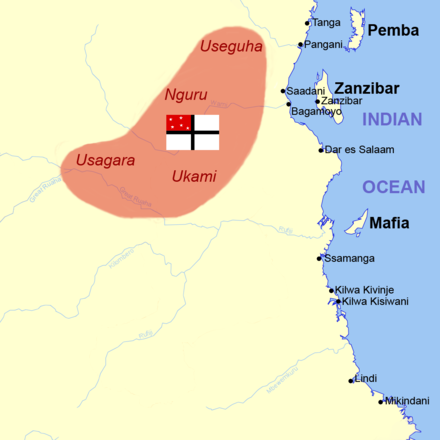
We note that the European countries, led by Britain and Germany, followed in the rest of the continent the political theory agreed upon in the Berlin Conference 1884-1885 AD, according to which the sovereign state over a coastal region also becomes sovereign over the back of this region from the inside, and based on this rule it was necessary to recognize The sovereignty of the Sultan over the interior, because it has been proven that he has effective sovereignty, without dispute On the coasts that are an outlet for these parts, but instead we find that England and Germany share the interior region and then return to the acquisition of coastal areas as outlets for the interior regions. In reality, this is nothing but a rape operation that is supported only by the armed forces, but it has no support from international law. However, the German-English agreement did not touch on the border area located in the western area of influence of both countries, which led to new problems between them.
The attitude of the citizens towards the German colonists:
German colonists accepted revolutions everywhere they tried to establish their feet in East or West Africa. In the east, the blocs of African colonists (patriots and expatriate Arabs) who knew this region in ancient times, as well as Indians and other Asians who had links to the east of the continent and all stood in the face of the colonists.
We will highlight some of these Revolutions:
1 / The revolution of Bushiri bin Saleh:
The German East Africa company that controlled the German East Africa did not find the way furnished with roses, and it did not enjoy peace and security, and it was faced from the first moment by violent resistance by the Arabs on the coast, and at the end of the field a leader called Bouchiri bin Saleh, who was taken from the city of Shambi As a center of his activity, he confronted the Germans and attacked them violently everywhere, and when the German company was unable to cope with the situation, I invoked the German government that appointed Hermann von Wehrmann and provided him with a huge force that managed to attack the revolutionaries and forced them to withdraw inside and the revolution intensified at home, but because the Germans dominated the coasts, external support was cut off Revolutionaries, and ended up arresting Boucheri, but even after his arrest and execution on December 15, 1889 AD, the resistance against German colonialism did not stop.
The situation between the German government and the revolutionaries did not improve, as the coast, and even the interior regions behind the city of Klou, remained in a state of alert and prepared to resist the German presence. The situation continued in this manner until a more violent, widespread, and greater danger erupted.
It is the Magi Revolution in 1905 AD which seriously threatened German colonialism and the movement increased the violence and terror that the German authorities practiced against the revolutionaries.
2 / The Magi Revolution:
This revolution is considered the most important movement in East Africa, and its local success helped along it from Lake Niassa and the coast of Klou and all Islamic and pagan tribes participated in it in an attempt to expel the Germans and carried out assassinations of officials and giving Missionary missions, European farmers, and merchants. This success encouraged the outbreak of the revolution and increased resistance against German colonists in various places.
Q: The question that arises now is: What are the reasons that led to this revolution against the Germans in East Africa?
A: To answer this question, we point out that the Magi Magi revolution, like other revolutions that the African national powers have carried out against foreign rule, has multiple causes, even though it agrees with the content. It is a revolution against the colonizer and his methods and means of exploiting peoples. The African people in East Africa revolted against The colonial means of the Germans in imposing taxes, the most important of which was the cottage tax introduced in 1895 AD, in addition to imposing a system of collective action, whether in paving roads or on European farms, as Africans revolted against local systems of government that were not accepted by the population.
In the opinion of Johnstein, the reason for the revolution is due to poor governance and the imposition of taxes, especially labor taxes on the population, which the nationalists were not familiar with, especially when the compulsory work was carried out for the benefit of European farmers. Julius summarized the reasons for the revolution when he indicated that the pursuit of freedom was one of the most prominent reasons for carrying out this revolution.
The movement began violently when more than eight thousand Africans revolted from the city of Mahing, on the thirteenth of July 1905 AD, and this huge number raises many questions about how these forces are organized in this way in a region that had not yet been known as political organization, and perhaps there are more From an explanation of this phenomenon, including that the revolutionaries were organized according to political or cultural groupings that led to their bloc, and also that the economic pressures resulting from German rule led to this gathering, and finally, the mobilization of people with this huge number may have taken place on a deeper basis than the tribal structure and by that I mean the religious factor Perhaps all of these factors interacted with the elements of time and space and eventually led to a revolt against German rule.
In sum, the revolution began as a popular movement among the peasants who suffered from the disadvantages of German rule and then strengthened their gravity to spread the religious beliefs that reached their climax.
The real beginning of the revolution was when a German East African ruler tried to cultivate cotton on a large scale and given that this crop had failed to cultivate in the northern coast, the experiment triumphed over the south, and the Germans believed individual cultivation was not feasible for large-scale cotton production and so the German ruler issued orders to draw up a plan To cultivate cotton and demanded that they be implemented in the experiments area near the (Rovici) river. Group projects and the last third of workers.
The end of German colonialism in Africa:
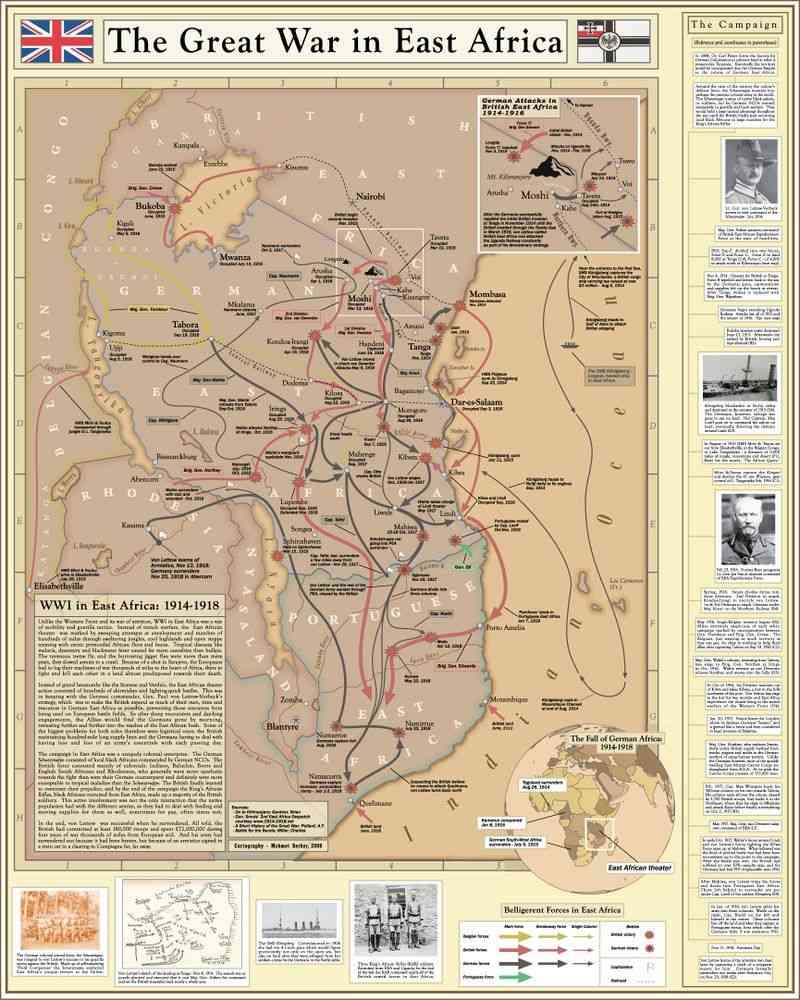
When the First World War (1914-1918) erupted, the Allied forces launched an attack on and occupied the German colonies from their neighboring colonies. And when Germany was defeated in the war, it was decided to deprive it of all its colonies as a punishment for it, and the League of Nations seized these colonies and pledged to administer them to the victorious states under the so-called (mandatory system), which means that the mandated countries administer the region and work to raise the level of its population and submit annual reports to (The Mandate Committee) explains the progress made by the administration in the region during the past year.
Under this system:
1 / German East Africa (Tanganyika) was placed under the British Mandate.
2 / (Togo) was divided into two parts, the largest part was given to France, and it was annexed to the Damobe colony, while the other part was given to England, and it was annexed as a coast colony.
3 / German (Cameroon) was divided into two, one for France, which included French Equatorial Africa, and the other for England, which was annexed to British Nigeria.
4 / South West Africa was placed under the mandate of the South African Union.
When the (United Nations Commission after the Second World War 1939-1945 AD) undertook to administer the German colonies in the same previous countries under the (guardianship) system. Thus the end of the First World War was a liquidation of German colonialism in Africa. And if that did not lead to the independence of these colonies, it was divided - as we have seen - by other major powers connected to the war. These colonies remained
Then it fights for its freedom.
It gained its full independence in December 1961 AD and Zanzibar gained its independence in December 1963 AD The two countries joined in a unified state and declared the establishment of the United Republic of Tanzania in 1964.
The British Togo joined Ghana after its independence in 1957 AD, while the French Togo became a republic on April 27, 1960 with its capital (Lome). French Cameroon became independent in January 1960 AD and joined the southern part of Cameroon.
Southwest Africa (Namibia):
After the First World War, the League of Nations entrusted the administration of southwestern Africa to the United Kingdom, which in turn entrusted the administration of the region to the Union of South Africa, and when the United Nations in 1945 (the trusteeship system) replaced the mandate system, South Africa tried to annex the region to it and applied the system of racial discrimination as it did As applied in South Africa itself, and in 1966 AD, the United Nations decided to end the administration of South Africa for the region and in 1968 announced the name of the region as (Namibia). South Africa refused to submit to United Nations resolutions, including Resolution 435 of 1978, which obligated it to end its management of the region. And the African patriots formed the People’s Organization for Southwestern Africa (SWAPO) led by the national struggle, and after several rounds of negotiations, South Africa linked its withdrawal to the withdrawal of Cuban forces from Angola.
In December 1988, the matter ended with the agreement on the withdrawal of South Africa from Namibia, and elections were held in Namibia at the end of 1989. The elections were won by the Swabo Party by a majority, and Namibia became an independent republic.
-EnRi

